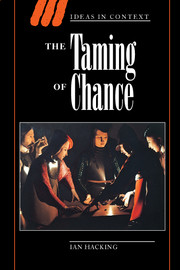Book contents
- Frontmatter
- Contents
- Acknowledgements
- 1 The argument
- 2 The doctrine of necessity
- 3 Public amateurs, secret bureaucrats
- 4 Bureaux
- 5 The sweet despotism of reason
- 6 The quantum of sickness
- 7 The granary of science
- 8 Suicide is a kind of madness
- 9 The experimental basis of the philosophy of legislation
- 10 Facts without authenticity, without detail, without control, and without value
- 11 By what majority?
- 12 The law of large numbers
- 13 Regimental chests
- 14 Society prepares the crimes
- 15 The astronomical conception of society
- 16 The mineralogical conception of society
- 17 The most ancient nobility
- 18 Cassirer's thesis
- 19 The normal state
- 20 As real as cosmic forces
- 21 The autonomy of statistical law
- 22 A chapter from Prussian statistics
- 23 A universe of chance
- Notes
- Index
- Ideas in Context
2 - The doctrine of necessity
Published online by Cambridge University Press: 05 June 2014
- Frontmatter
- Contents
- Acknowledgements
- 1 The argument
- 2 The doctrine of necessity
- 3 Public amateurs, secret bureaucrats
- 4 Bureaux
- 5 The sweet despotism of reason
- 6 The quantum of sickness
- 7 The granary of science
- 8 Suicide is a kind of madness
- 9 The experimental basis of the philosophy of legislation
- 10 Facts without authenticity, without detail, without control, and without value
- 11 By what majority?
- 12 The law of large numbers
- 13 Regimental chests
- 14 Society prepares the crimes
- 15 The astronomical conception of society
- 16 The mineralogical conception of society
- 17 The most ancient nobility
- 18 Cassirer's thesis
- 19 The normal state
- 20 As real as cosmic forces
- 21 The autonomy of statistical law
- 22 A chapter from Prussian statistics
- 23 A universe of chance
- Notes
- Index
- Ideas in Context
Summary
In 1892 the iconoclastic American philosopher C.S. Peirce proposed ‘to examine the common belief that every single fact in the universe is determined by law’. ‘The proposition in question’ – he called it the doctrine of necessity – ‘is that the state of things existing at any time, together with certain immutable laws, completely determines the state of things at every other time.’ His examination was venomous. At the end: ‘I believe I have thus subjected to fair examination all the important reasons for adhering to the theory of universal necessity, and shown their nullity.’ That was only the negative beginning. Peirce positively asserted that the world is irreducibly chancy. The apparently universal laws that are the glory of the natural sciences are a by-product of the workings of chance.
Peirce was riding the crest of an antideterminist wave. As is so often the case with someone who is speaking for his time, he thought himself alone. ‘The doctrine of necessity has never been in so great a vogue as now.’ He did warn against supposing ‘that this is a doctrine accepted everywhere and at all times by all rational men.’ Nevertheless he had to peer back into the distant past to find people with whom he agreed. The philosophy of Epicurus and the swerving atoms of Lucretius were, in his opinion, precursors of the statistical mechanics of Maxwell, Boltzmann and Gibbs. He had more allies than he imagined, but he was right in thinking that his examination of the doctrine of necessity would have been unthinkable in the eighteenth century.
Information
- Type
- Chapter
- Information
- The Taming of Chance , pp. 11 - 15Publisher: Cambridge University PressPrint publication year: 1990
Accessibility standard: Unknown
Why this information is here
This section outlines the accessibility features of this content - including support for screen readers, full keyboard navigation and high-contrast display options. This may not be relevant for you.Accessibility Information
- 2
- Cited by
